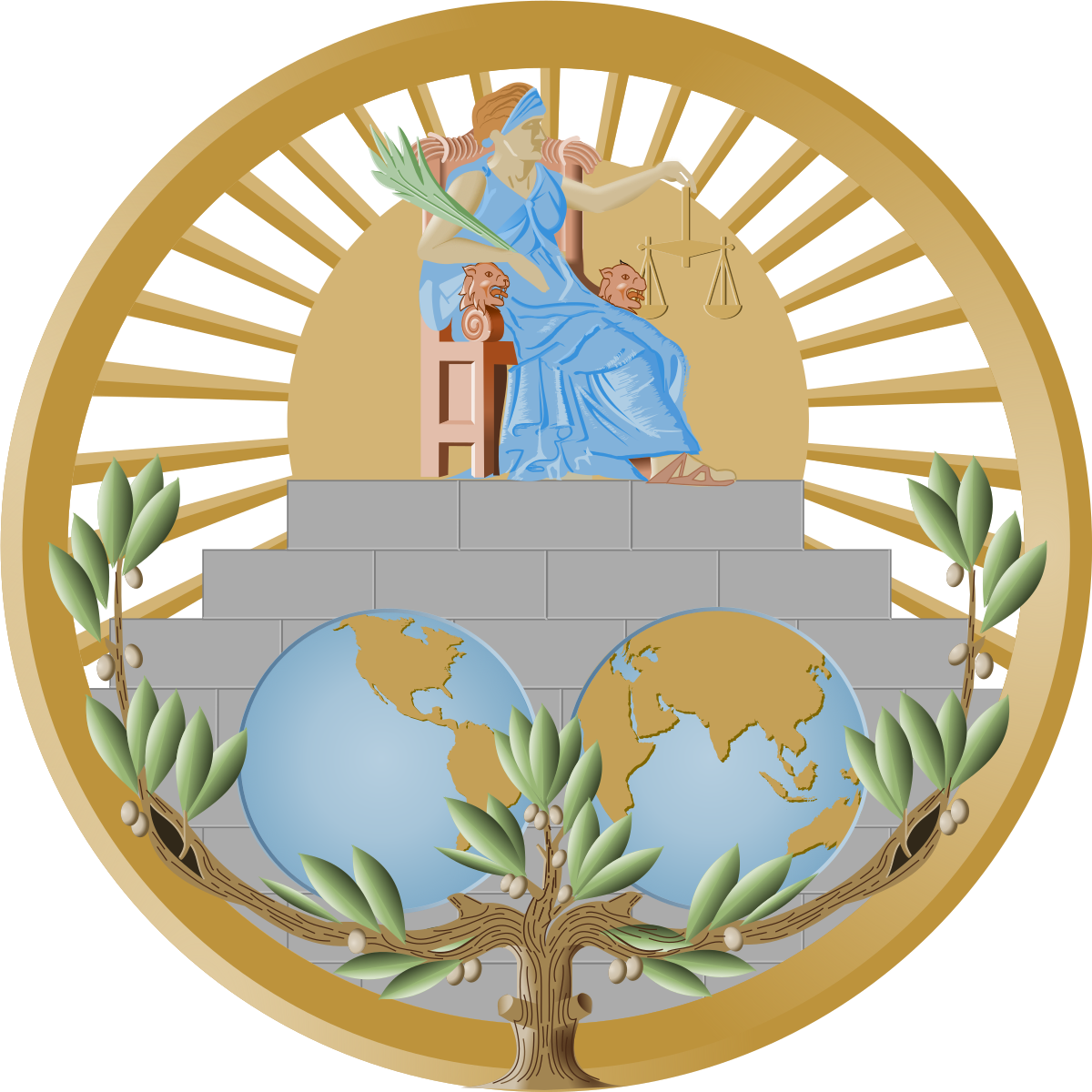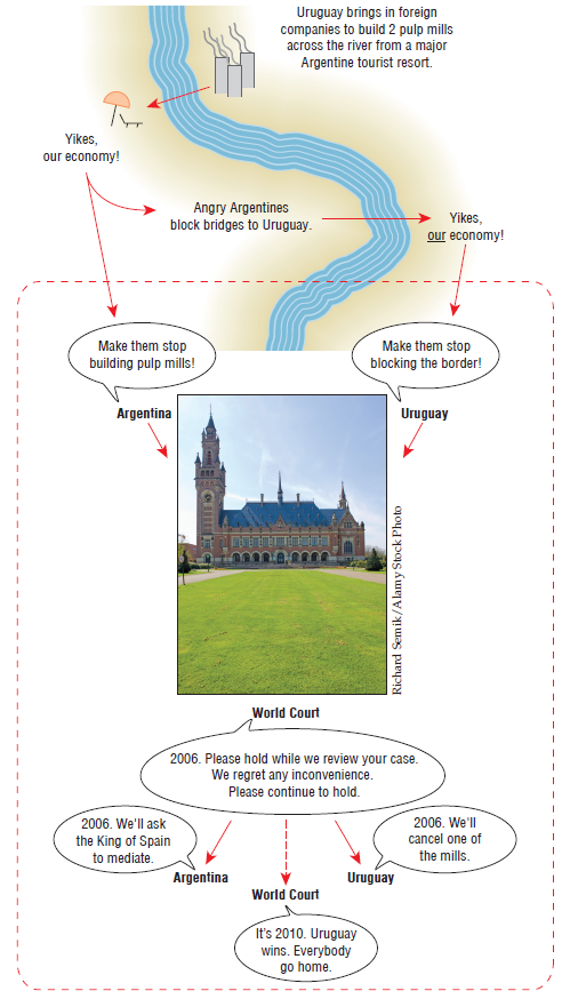Chapter 8 World Court

The International Court of Justice (ICJ)
Mandate: to settle inter-state legal disputes with the consent of both parties
Structure: 15 international judges provide definitive legal judgments when requested by states
Obligation: states agree to follow the decisions of the Court in cases to which they are a party, and to carry out provisional measures as requested by the Court
Enforcement: a party that is unsatisfied with the performance of the losing party in a case may refer the matter to the UN Security Council
8.1 Matters that international law deals with
Refugees: People fleeing their countries to find refuge from war, natural disaster, or political persecution. International law distinguishes them from migrants.
Human rights: Universal declaration of human rights (UDHR 1948). The core UN document on human rights; although it lacks the force of international law, it sets forth international norms regarding behavior by governments toward their own citizens and foreigners alike.
Genocide: An intentional and systematic attempt to destroy a national, ethnic, racial, or religious group, in whole or in part. It was confirmed as a crime under international law by the UN Genocide Convention (1948). See also crimes against humanity and dehumanization.
Just wars: A category in international law and political theory that defines when wars can be justly started (jus ad bellum) and how they can be justly fought (jus in bello). See also war crimes.
Just-War Doctrine
• Just wars: legal (vs. wars of aggression, which are not)
• For a threat to constitute aggression (and justify the use of force in response), it must be a clear threat of using force, not just a hostile policy or general rivalry
• States have the right to respond to aggression by:
– Repelling the attack itself
– Punishing the aggressor
• Response to aggression is the only allowable use of military force in just-war doctrine
– For war to be morally just, it must be waged for the purpose of responding to aggression
• Just wars: A category in international law and political theory that defines when wars can be justly started (jus ad bellum) and how they can be justly fought (jus in bello). See also war crimes.
8.2 Sources of law
• Derives from tradition and agreements signed by states
• Depends on powers of reciprocity, collective action, and international norms Sources of International Law
• Treaties and other written conventions signed by states are the most important source
– They are binding on successor governments
– UN Charter is one of the world’s most important treaties
• Custom is the second major source
– If states behave toward each other a certain way for long enough, behavior may become accepted practice with status of law
Sources of International Law continued
• General principles of law
– Actions recognized by most legal systems as crimes tend to have same meaning in international context
• Legal scholarship
– Written arguments of judges and lawyers around the world on issues in question
• Often international law lags behind changes in norms
General principles of law are basic rules whose content is very general and abstract, sometimes reducible to a maxim or a simple concept.
It requires, as well, measures to ensure adherence to the principles of supremacy of law, equality before the law, accountability to the law, fairness in the application of the law, separation of powers, participation in decision-making, legal certainty, avoidance of arbitrariness and procedural and legal transparency.
8.3 Enforcement of International Law
• Difficult to enforce (no world police) • Dependent upon
– Reciprocity principle
▪ States follow international laws because they want others to also
– Collective response by a group of states
▪ A state that breaks international law may face collective response by group of states, such as sanctions
– Common expectations regarding the rules of the game and adherence to those rules most of the time by most actors
▪ Costs of breaking the rules outweigh the short-term benefits that could be gained from violations
8.4 About the ICJ
• World Court (International Court Justice): UN branch
– Panel of 15 judges elected for nine-year terms (five judges every three years) by a majority of both the Security Council and General Assembly
• Almost all states have signed the treaty creating the Court, but only about a third have signed the optional clause to give the Court jurisdiction in certain cases
• Main use: to arbitrate issues of secondary importance between countries with friendly relations overall
• States have used Court infrequently over the years—a dozen or fewer cases per year (about 150 judgments and advisory opinions since 1947)
• World Court: Also called the International Court of Justice (ICJ). The judicial arm of the UN; located in The Hague, it hears only cases between states.
Germany v Denmark and the Netherlands [1969] ICJ 1 (also known as The North Sea Continental Shelf cases) were a series of disputes that came to the International Court of Justice in 1969. They involved agreements among Denmark, Germany, and the Netherlands regarding the “delimitation” of areas—rich in oil and gas—of the continental shelf in the North Sea.
8.5 Case study

A pulp mill is a manufacturing facility that converts wood chips or other plant fiber source into a thick fiber board which can be shipped to a paper mill for further processing.
World court case of Argentina vs. Uruguay
Argentina and Uruguay signed a treaty in 1975 governing the river on their border. Uruguay brings in foreign companies to build 2 pulp mills across the river from a major Argentine tourist resort.
Argentina’s reaction: “Yikes, our economy!”
Angry Argentines block bridges to Uruguay and ask World Court to make them stop building pulp mills!
Uruguay’s reaction: “Yikes, our economy!”
Uruguay also asks World Court to make them stop blocking the border!
World Court (2006): Please hold while we review your case. We regret any inconvenience. Please continue to hold.
Argentina (2006): We will ask the King of Spain to mediate.
Uruguay (2006): We will cancel one of the mills.
World Court (2010): It’s 2010. Uruguay wins. Everybody go home.?